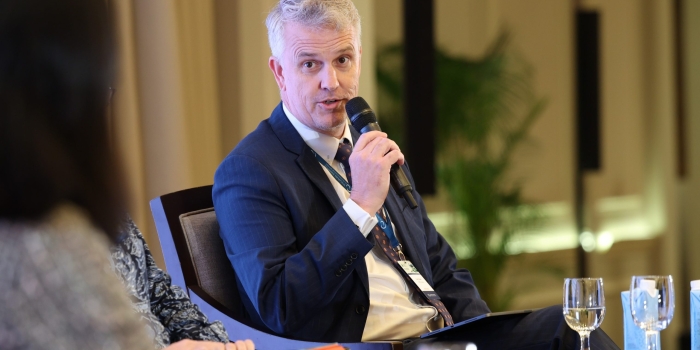RGE: Operating at the heart of sustainability
RGE's global business groups operate with a clear vision, guided by the 5Cs principle – Good for Community, Country, Climate, Customer and Company - and our Sustainability Framework. Our commitment...

Latest updates on what's happening in RGE Group

Policymakers, investors, and the public are increasingly demanding that companies not only mitigate their negative impacts but actively contribute to restoring and regenerating natural ecosystems. At the same time, global demand for resources is projected to keep growing, driven by rising populations and incomes in developing economies. This will require a fundamental transformation of “business as usual” approaches.
This was the focus of a recent panel at the Singapore Dialogue on Sustainable World Resources (SWR) on the topic of “The Road Ahead for the Resource Sector – Policy And Market Directions” earlier in May, which brought together representatives from government, civil society and industry to discuss the path forward for strengthening sustainability and resilience in the resources sector amidst economic and geopolitical uncertainties.
The panel discussion featured Craig Tribolet, Deputy Director of Sustainability at APRIL Group, along with Dr Dradjad Hari Wibowo, Chairman and Founder of the Indonesian Forestry Certification Cooperation (IFCC), Joseph (JD) D’Cruz, CEO of the Roundtable on Sustainable Palm Oil (RSPO) and Olivier Tichit, Director of Sustainability at Musim Mas. The discussion was moderated by Cheryl Chen, President of S&P Global Foundation and Senior Director of Social Sustainability at S&P Global.
Sustainability Needs to be a Key Business Driver, not an “Add-On”
Tribolet shared how APRIL is working to balance ambitious conservation and restoration efforts with strong business growth. Over the past decade, APRIL has shown it is possible to increase productivity and expand manufacturing while also making significant investments in protecting and restoring natural ecosystems.
A key milestone was the launch of APRIL’s Sustainable Forest Management Policy (SFMP) 2.0 in 2015. Developed through extensive consultation with NGOs, local communities, technical experts and government, the SFMP 2.0 set out ambitious commitments that went well beyond regulatory requirements. This included a 1-for-1 commitment to conserve or restore one hectare of forest for every hectare of plantation developed.
Tribolet emphasised that this level of ambition was only possible because sustainability was embedded as a core pillar of the company’s business strategy, not a siloed “add-on.” Internally, conservation shifted from being seen as a cost centre to an essential investment for ensuring the company’s long-term viability. This was backed by innovative financing mechanisms, such as diverting $1 from every ton of fibre processed at the company’s mill to fund conservation at landscape scale. Since its launch in 2020, this initiative has generated around $50 million for conservation efforts and partnerships.
No Lack of Challenges in the Coming Years
While APRIL’s experience shows what is possible with the right mindset and incentives, Tribolet acknowledged that the coming years will bring no shortage of challenges for the wider industry. Demand for resources will continue to rise as billions of people in emerging economies aspire to the same choices and quality of life as the developed world. At the same time, supply will face ever-tighter constraints – not only in terms of available land, but also from more stringent national and international regulations as well as rising expectations around disclosure and reporting.
“Engaging with these requirements comes at a cost, which may isolate some small suppliers who cannot meet the increased expenses associated with certification, regulation, and voluntary disclosure. They may struggle to access markets, such as a large marketplace in Europe that wants to set new standards, particularly for smallholders, to address the requirements of these systems,” said Tribolet.
“However, greater transparency and disclosure can also be viewed as a positive development, as it potentially provides market opportunities for those who are doing the right things in the sustainability space,” he added. “Companies that invest in nature and conservation can make important contributions and benefit from being market leaders in implementing these discussions, beyond just reputational advantages.”
To drive complex challenges facing us globally requires a multifaceted approach, with sustainability being a core business strategy rather than a mere “nice to have.” Developing effective solutions necessitates genuine and inclusive multi-stakeholder processes that engage all relevant parties. Implementing landscape-scale actions beyond individual concessions is essential for driving meaningful impact, ensuring a broader and comprehensive approach to conservation. Innovative financing mechanisms can also play a vital role in unlocking new funding streams to support these efforts. As expectations continue to rise, the industry must proactively support smallholders, enabling them to ‘level up’ and meet the growing demands for sustainable practices.
The Way Forward
With the right strategies, incentives and collaborations, the resource sector can become a powerful engine for building an economy that is not only prosperous and inclusive, but also nature positive. Harnessing the power of markets and enterprise to restore the natural systems that sustain us all.
Taking Indonesia as an example of balancing economic growth with conservation and restoration, Tribolet said: “The track record of Indonesia and APRIL demonstrates that a strong economy and business growth can go hand in hand with conservation and restoration efforts. It is not an either-or proposition; instead, economic development and environmental sustainability can be mutually reinforcing goals.”